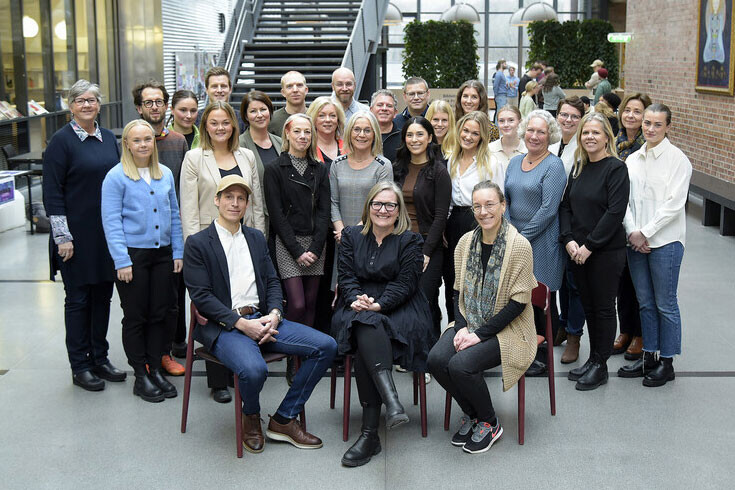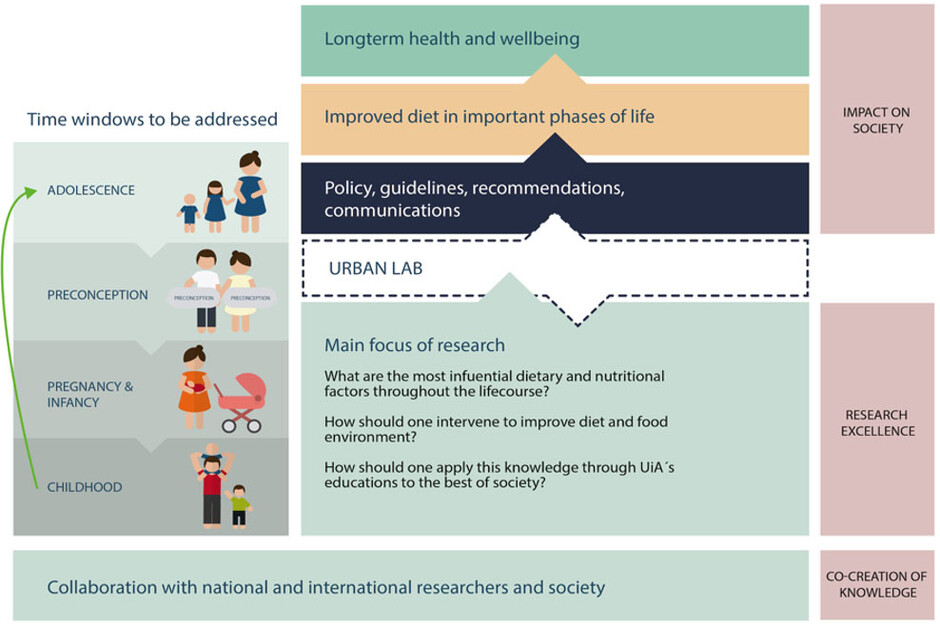Who we are

We are 33 experienced researchers with interdisciplinary and complementary competences, all joining forces to work within the field of diet, nutrition and lifecourse approaches. Our research centre includes several PhD-students, master students in addition to the research team.
Why is our work important?
Advances in early life nutrition science has profoundly changed the way we understand the origins of lifelong health and development. We now know that early life nutrition has major influences on how health unfolds over the lifespan, with potentially large consequences for public health and public health priorities. In our research early life includes important developmental phases where The PRC will advance the field of early life nutrition science by developing high quality and cutting-edge research, both within epidemiological and applied research like intervention and implementation sciences.
What are we doing?
Our vision: Children and young people grow up in environments which enable them and future generations to live long and healthy lives.
Our mission: Work with partners and stakeholders to generate knowledge and use it to create healthy and sustainable food environments in which children, young people families and future generations thrive.
Scientifically, we pursue our ambitions for excellence in research within lifecourse nutrition as depicted in the figure below.

The research centre has four overarching ambitions. With these ambitions we also respond to internal UiA strategy of co-creating knowledge, working interdisciplinary, focusing on sustainability, health and living conditions and adding to the research field of psychology (important for establishment of the Psychology study programme).
1. Advancing the understanding of what the influential dietary factors for child development and health across the lifecourse and what constitutes a healthy food environment.
We work to advance knowledge on sustainable and healthy diets applying a lifecourse perspective. We specifically focus on the field of preconception research through our PREPARED cohort study. We will in coming years emphasize diet-mental health associations and dietary factors important for child development, quality of life and children’s educational achievement. We continue our work on food systems and their entanglements with culture, everyday life, and health.
2. Generating evidence of effective interventions and actions for sustainable improvements to diet and health across the lifecourse.
We are investigating the effectiveness of our ongoing interventions and are extending this by evaluating and implementing interventions at a structural level in co-creation with our partners and stakeholders in our planned Urban Lab (see ambition 3 below). We also conduct educational interventions in our study programs for teachers, nutritionists and public health workers.
3. Co-create an Urban Lab with partners/stakeholders to generate knowledge of how to implement effective interventions in the community, addressing both policy, administrative and the different settings in a community.
Experience from our ongoing projects, like Nutrition Now, has demonstrated that when a project is anchored at several levels and across different sectors, ripple effects can occur leading to a raft of other positive changes supplemental to the original intervention. For this ambition, we will use these experiences to co-create, plan, develop and evaluate interventions on different levels; these include individuals, settings, and policy, addressing the whole food environment and its entanglements to create healthy and sustainable food environments. The Urban Lab will be instrumental as a location and vehicle for testing ideas and engaging with different stakeholders (e.g., school children, teachers, politicians, parents, shops, farmers) to identify and prioritise needs and gaps to create a healthy food environment for the present and future generations. We will be able to test whether initiatives work and identify what effects they have on specific outcomes and whether there are unexpected outcomes. The Urban lab will comprise one or more urban locations in the Agder region of Norway where we have established extensive relationships with multiple partners and stakeholders, which will enable genuine co-creation and testing of interventions in real world settings.
4. Impact society by scaling up successful interventions, translating generated knowledge through higher education and disseminating our findings to the wider public.
We plan to scale up interventions tested in our Urban Lab to have societal impact. In addition, our direct involvement in higher education programs comprise Public Health, Public Health Nutrition, school and ECEC teacher education, and Public Health Nursing, contributing to workforce knowledge of the fundamental importance of healthy eating, healthy food environments and sustainable food systems. We will facilitate learning by translating generated Research Centre knowledge to students with innovative pedagogy and knowledge of specific tools developed and strategies identified in our Urban Lab, for them to apply and implement in their future work, thus translating their knowledge into benefit across the region and into wider society. In addition, we will disseminate our findings not only to the scientific community, but to different audience (decision makers, practitioners, stakeholders, users and the general public) at both regional, national and international levels. We will work with our UAB and SAB to find the best ways to raise awareness, understanding and impact of our field.
This summarizes our four ambitions for the next years and shows that the ambitions are connected, meaning that knowledge gained from one will inform the other.
